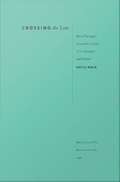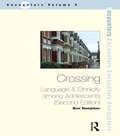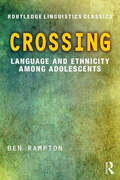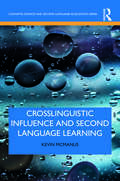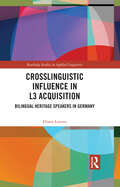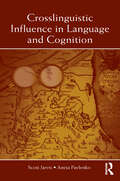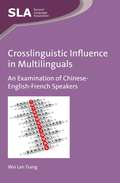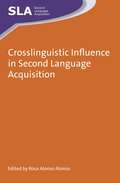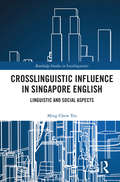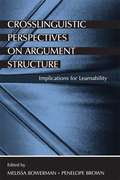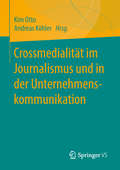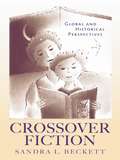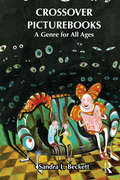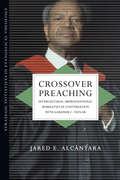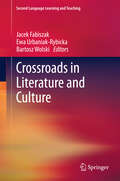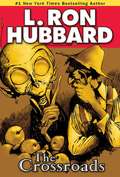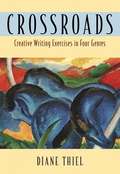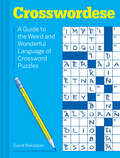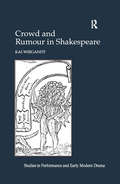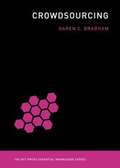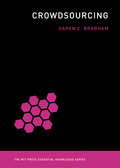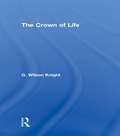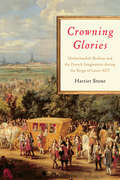- Table View
- List View
Crossing the Line: Racial Passing in Twentieth-Century U.S. Literature and Culture
by Gayle WaldAs W. E. B. DuBois famously prophesied in The Souls of Black Folk, the fiction of the color line has been of urgent concern in defining a certain twentieth-century U. S. racial "order. " Yet the very arbitrariness of this line also gives rise to opportunities for racial "passing," a practice through which subjects appropriate the terms of racial discourse. To erode race's authority, Gayle Wald argues, we must understand how race defines and yet fails to represent identity. She thus uses cultural narratives of passing to illuminate both the contradictions of race and the deployment of such contradictions for a variety of needs, interests, and desires. Wald begins her reading of twentieth-century passing narratives by analyzing works by African American writers James Weldon Johnson, Jessie Fauset, and Nella Larsen, showing how they use the "passing plot" to explore the negotiation of identity, agency, and freedom within the context of their protagonists' restricted choices. She then examines the 1946 autobiography Really the Blues, which details the transformation of Milton Mesirow, middle-class son of Russian-Jewish immigrants, into Mezz Mezzrow, jazz musician and self-described "voluntary Negro. " Turning to the 1949 films Pinky and Lost Boundaries, which imagine African American citizenship within class-specific protocols of race and gender, she interrogates the complicated representation of racial passing in a visual medium. Her investigation of "post-passing" testimonials in postwar African American magazines, which strove to foster black consumerism while constructing "positive" images of black achievement and affluence in the postwar years, focuses on neglected texts within the archives of black popular culture. Finally, after a look at liberal contradictions of John Howard Griffin's 1961 auto-ethnography Black Like Me, Wald concludes with an epilogue that considers the idea of passing in the context of the recent discourse of "color blindness. " Wald's analysis of the moral, political, and theoretical dimensions of racial passing makes Crossing the Line important reading as we approach the twenty-first century. Her engaging and dynamic book will be of particular interest to scholars of American studies, African American studies, cultural studies, and literary criticism.
Crossing: Language and Ethnicity Among Adolescents (Routledge Linguistics Classics Ser.)
by Ben RamptonVolume 5 This is a new and enlarged edition of Ben Rampton's ground-breaking study of sociolinguistic processes in urban youth culture. It focuses on language crossing - the use of Panjabi by adolescents of African-Caribbean and Anglo descent, the use of Creole by adolescents with Panjabi and Anglo backgrounds, and the use of stylized Indian English. Its central question is: how far and in what ways do these intricate processes of language sharing and exchange help to overcome race stratification and contribute to a new sense of mixed youth, class and neighbourhood community? Ben Rampton produces detailed ethnographic and interactional analyses of spontaneous speech data, and integrates the discussion of particular incidents with theories of discourse, code-switching, social movements, resistance and ritual drawn from sociolinguistics, sociology, anthropology and cultural studies. Vivid descriptions of adolescent life in youth clubs and school playgrounds provide an important insight into the ways in which young people manage to 'live with difference', and full consideration is given to crossing's critical implications for education policy.
Crossing: Language and Ethnicity among Adolescents (Routledge Linguistics Classics)
by Ben RamptonFocusing on urban youth culture and language crossing, this foundational volume by Ben Rampton has played a pivotal role in the shaping of language and ethnic identity as a domain of study. It focuses on language crossing - the use of Panjabi by adolescents of African-Caribbean and Anglo descent, the use of Creole by adolescents with Panjabi and Anglo backgrounds, and the use of stylized Indian English. Crossing’s central question is: how far and in what ways do these intricate processes of language sharing and exchange help to overcome race stratification and contribute to a new sense of mixed youth, class and neighbourhood community? Ben Rampton produces detailed ethnographic and interactional analyses of spontaneous speech data, and integrates the discussion of particular incidents with theories of discourse, code-switching, social movements, resistance and ritual drawn from sociolinguistics, sociology, anthropology and cultural studies. Now a Routledge Linguistics Classic with a new preface which sets the work in its current context, this book remains key reading for all those working in the areas of applied linguistics, sociolinguistics and linguistic anthropology.
Crosslinguistic Influence and Second Language Learning (Cognitive Science and Second Language Acquisition Series)
by Kevin McManusCrosslinguistic Influence and Second Language Learning provides a comprehensive overview of what is currently known about prior language knowledge and experience in second language learning. Three bodies of research are critically reviewed to achieve this goal: (i) theories of language learning that attribute critical roles to prior experience in explaining second language development, (ii) empirical studies of second language learning that have investigated roles for crosslinguistic influence, and (iii) instructional studies that have supported second language learning by addressing the negative effects of crosslinguistic influence. Using this foundation, new research directions and theorization in the field of second language acquisition are proposed. This book will serve as an excellent resource for students and scholars with interests in (instructed) second language learning, applied linguistics, cognitive psychology, psycholinguistics, and language education.
Crosslinguistic Influence in L3 Acquisition: Bilingual Heritage Speakers in Germany (Routledge Studies in Applied Linguistics)
by Eliane LorenzThis book explores crosslinguistic influence in third language acquisition, drawing insights from a study of young bilingual secondary school students in Germany to unpack the importance of different variables in the acquisition and use of English as an additional language. Lorenz draws on data from a learner corpus of written and spoken picture descriptions toward analyzing sources of crosslinguistic influence in L3 acquisition in bilingual heritage speakers with unbalanced proficiency in heritage versus majority languages as compared with their monolingual German peers. This unique approach allows for a clearer understanding of the extent of influence of access to heritage languages, the impact of being a "balanced" vs "unbalanced" bilingual speaker, and the importance of extra-linguistic variables, such as age, gender, socio-economic status, and type of school. The final two chapters highlight practical considerations for the English language classroom and the implications of the study for future directions for research on third language acquisition. With its detailed overview of L2 and L3 acquisition and contribution toward ongoing debates on the advantages of being bilingual and multilingual, this book will be of interest to students and scholars in applied linguistics, foreign language acquisition, foreign language teaching, and learner corpus research.
Crosslinguistic Influence in Language and Cognition
by Aneta Pavlenko Scott JarvisA cogent, freshly written synthesis of new and classic work on crosslinguistic influence, or language transfer, this book is an authoritative account of transfer in second-language learning and its consequences for language and thought. It covers transfer in both production and comprehension, and discusses the distinction between semantic and conceptual transfer, lateral transfer, and reverse transfer. The book is ideal as a text for upper-level undergraduate and graduate courses in bilingualism, second language acquisition, psycholinguistics, and cognitive psychology, and will also be of interest to researchers in these areas.
Crosslinguistic Influence in Multilinguals: An Examination of Chinese-English-French Speakers
by Wai Lan TsangThis book reports on a research project conducted in multilingual Hong Kong, where Cantonese is the mother tongue (L1) of the majority of the population and learning different foreign languages is commonplace. In addition to English, which is usually the second language (L2), more and more people learn other languages, such as French (L3). Drawing on the notions of 'interface' and 'reverse transfer' in second language acquisition, this book addresses the possible role of L3 French in the acquisition of English as an L2 with two major concerns: firstly, the degree to which L3 acquisition will bring about a positive or negative transfer effect on L2 acquisition and secondly, the way in which an L3 interacts with an L2 and/or even an L1 on different interfaces as identified in second language acquisition. The study will appeal to researchers interested in second and third language acquisition, bi- and multilingualism and crosslinguistic influence.
Crosslinguistic Influence in Second Language Acquisition
by Rosa Alonso AlonsoThis volume provides an unprecedented insight into current approaches to crosslinguistic influence (CLI). The collection investigates a range of themes including linguistic relativity, the possible contributions of neurolinguistics, the problem of cognitive development and the role of the frequency of structures in acquisition from distinct, overlapping and complementary perspectives. Chapters focusing on vocabulary, morphosyntactic categories, semantic structures, and phonetic and phonological structures feature in the volume, as do over 20 languages, in order to offer new insights into both theoretical and empirical issues in CLI, including the consequences of great or little similarity in structures between languages. The relevance of CLI research for teaching is discussed in a number of chapters, as is the phenomenon of multilingualism. The collection will appeal to researchers, graduate and postgraduate students, teachers and professionals interested in the field of CLI in SLA.
Crosslinguistic Influence in Singapore English: Linguistic and Social Aspects (Routledge Studies in Sociolinguistics)
by Ming Chew TeoIn a social setting where speakers with several languages interact extensively, a major source of variation in Colloquial Singapore English comes from the complex interaction between crosslinguistic influences and various social and linguistic factors. By unifying both social and linguistic aspects of the phenomenon through the use of multivariate analyses like logistic regressions and Poisson regressions, this book represents a novel approach to the study of crosslinguistic influence in Colloquial Singapore English. As multivariate analyses provide us with information regarding the relative strengths of each social and linguistic factor, they are useful tools that allow us to have a more nuanced understanding of crosslinguistic influence in contact situations. Linguistic features from a variety of linguistic domains – morphology, semantics, and discourse – will be quantified, and statistical analyses will be run in R to determine the degree to which various social and linguistic factors affect the extent of crosslinguistic influence. Well-known Singlish features like the optionality of past tense and plural marking, the unique meanings of already, got, and one, and discourse particles lah, leh, and lor, are analyzed using this approach. The statistical modeling of these features is a first step towards creating a unified framework to understanding crosslinguistic influence.
Crosslinguistic Perspectives on Argument Structure: Implications for Learnability
by Penelope Brown Melissa BowermanThis book offers a unique interdisciplinary perspective on argument structure and its role in language acquisition. Drawing on a broad range of crosslinguistic data, this volume shows that languages are much more diverse in their argument structure properties than has been realized.The volume is the outcome of an integrated research project and com
Crossmedialität im Journalismus und in der Unternehmenskommunikation
by Andreas Köhler Kim OttoCrossmedialität ‒ das Kreuzen der Medien ‒ ist einer der großen Trends im Journalismus und in der Unternehmenskommunikation. Inhalte werden über mehrere Plattformen publiziert, Organisation, Planung, Recherche und Qualitätssicherung passen sich an. Medienkonvergenz wird von einem theoretischen Konzept zur Medienpraxis. Dieser Band beschreibt den crossmedialen Wandel und erfasst dessen Stand. Dies erfolgt sowohl auf theoretischer als auch auf empirischer Ebene. Zudem werden die Auswirkungen des crossmedialen Wandels auf die Rezeption von Medien empirisch beschrieben und Konzepte dargestellt.
Crossover Fiction: Global and Historical Perspectives (Children's Literature and Culture)
by Sandra L. BeckettIn Crossover Fiction, Sandra L. Beckett explores the global trend of crossover literature and explains how it is transforming literary canons, concepts of readership, the status of authors, the publishing industry, and bookselling practices. This study will have significant relevance across disciplines, as scholars in literary studies, media and cultural studies, visual arts, education, psychology, and sociology examine the increasingly blurred borderlines between adults and young people in contemporary society, notably with regard to their consumption of popular culture.
Crossover Picturebooks: A Genre for All Ages (Children's Literature and Culture)
by Sandra L. BeckettThis book situates the picturebook genre within the widespread international phenomenon of crossover literature, examining an international corpus of picturebooks — including artists’ books, wordless picturebooks, and celebrity picturebooks — that appeal to readers of all ages. Focusing on contemporary picturebooks, Sandra Beckett shows that the picturebook has traditionally been seen as a children’s genre, but in the eyes of many authors, illustrators, and publishers, it is a narrative form that can address any and all age groups. Innovative graphics and formats as well as the creative, often complex dialogue between text and image provide multiple levels of meaning and invite readers of all ages to consider texts that are primarily marketed as children’s books. The interplay of text and image that distinguishes the picturebook from other forms of fiction and makes it a unique art form also makes it the ultimate crossover genre. Crossover picturebooks are often very complex texts that are challenging for adults as well as children. Many are characterized by difficult "adult" themes, genre blending, metafictive discourse, intertextuality, sophisticated graphics, and complex text-image interplay. Exciting experiments with new formats and techniques, as well as novel interactions with new media and technologies have made the picturebook one of the most vibrant and innovative contemporary literary genres, one that seems to know no boundaries. Crossover Picturebooks is a valuable addition to the study of a genre that is gaining increasing recognition and appreciation, and contributes significantly to the field of children’s literature as a whole.
Crossover Preaching: Intercultural-Improvisational Homiletics in Conversation with Gardner C. Taylor (Strategic Initiatives in Evangelical Theology)
by Jared E. AlcántaraAs society becomes more culturally diverse and globally connected, churches and seminaries are rapidly changing. And as the church changes, preaching must change too. Crossover Preaching proposes a way forward through conversation with the "dean of the nation?s black preachers," Gardner C. Taylor, senior pastor emeritus of Concord Baptist Church in Brooklyn, New York. In this richly interdisciplinary study, Jared E. Alcántara argues that an analysis of Taylor's preaching reveals an improvisational-intercultural approach that recovers his contemporary significance and equips U. S. churches and seminary classrooms for the future. Alcántara argues that preachers and homileticians need to develop intercultural and improvisational proficiencies to reach an increasingly intercultural church. Crossover Preaching equips them with concrete practices designed to help them cultivate these competencies and thus communicate effectively in a changing world.
Crossroads in Literature and Culture (Second Language Learning and Teaching)
by Jacek Fabiszak Bartosz Wolski Ewa Urbaniak-RybickaThe book contains a selection of papers focusing on the idea of crossing boundaries in literary and cultural texts composed in English. The authors come from different methodological schools and analyse texts coming from different periods and cultures, trying to find common ground (the theme of the volume) between the apparently generically and temporarily varied works and phenomena. In this way, a plethora of perspectives is offered, perspectives which represent a high standard both in terms of theoretical reflection and in-depth analysis of selected texts. Consequently, the volume is addressed to a wide scope of both scholars and students working in the field of English and American literary and cultural studies; furthermore, it will be of interest also to students interested in theoretical issues linked with investigations into literature and culture.
Crossroads, The
by L. Ron HubbardExplore new worlds. Frustrated with a government that pays him to bury surplus produce in order to "fix" the economy while city folk starve, farmer Eben Smith decides to take matters into his own hands. He piles up his wagon with ripe fruits and vegetables and sets out for the first time to barter his goods in the big city.Being Eben's first city trip and all, the way soon becomes uncertain. But when Eben comes across a strange crossroads, he discovers that he's fallen into a nexus in time. Soon he's bartering a lot more than goods with different cultures in alternative realities . . . accidentally wreaking havoc and chaos in each. ALSO INCLUDES THE FANTASY STORIES "BORROWED GLORY" AND "THE DEVIL'S RESCUE" "Once again another collection of larger than life stories to lose yourself for a couple of hours." --Gil T's Pleasure Blog* An International Book Awards Finalists
Crossroads: Classic Themes in Young Adult Literature
by Robert CormierA compilation of stories and poems from all types of writing for young adults.
Crossroads: Creative Writing in Four Genres
by Diane ThielIn Crossroads, a wealth of exercises and rich diversity of models address the elements of writing fiction, poetry, creative nonfiction, and drama while developing an individual's writing skills. Clear, concise discussions of particular techniques of creative writing are followed by practice of these individual techniques. Potent, vital models are offered in an extensive anthology of classic and contemporary readings.
Crosswalk Coach for the Common Core State Standards, English Language Arts, Grade 5
by Charles ValleYou've Come to the Right Place for Student Achievement! It's time to be proactive-get to know the newly adopted Common Core State Standards with New York Crosswalk Coach! As new, rigorous student-achievement expectations are introduced across your state, rest assured Crosswalk Coach has you covered. New York Crosswalk Coach clearly identifies how the standards are embedded in the new Common Core. This robust resource provides an easy approach to teaching the CCSS and is a great professional development tool for educators.
Crosswordese: The Weird and Wonderful Language of Crossword Puzzles
by David BukszpanThis game changing guide to crosswords will improve your skills while exploring the hows, whys, and history of the crossword and its evolution over time, from antiquity to the age of LOL and MINAJ.Crossword puzzles have a language all their own. Packed full of trick clues, trivia about common answers, and crossword trends, Crosswordese is a delightful celebration of the crossword lexicon and its checkered history of wordplay and changing cultural references. Much, much more than a dictionary, this is a playful, entertaining, and educational read for word gamers and language lovers.The perfect present or gift for yourself, Crosswordese will be a hit with crossword puzzlers of all skill levels, word nerds, fans of all varieties of word games, and language enthusiasts.• BEYOND CROSSWORDS: Hooked on crosswords? Now you can discover even more to enjoy about the history and trivia behind the terms and clues you love.• FOR BEGINNERS, EXPERTS, AND WORD NERDS ALIKE: Beginners will find it a boon to their solving skills; veteran crossworders will learn more about the vocabulary they employ every morning; and those interested in language will have plenty of "Aha!" moments.• CROSSWORD PUZZLES INCLUDED! The author has specially created a number of puzzles based on the book's content inside!
Crowd and Rumour in Shakespeare (Studies in Performance and Early Modern Drama)
by Kai WiegandtIn this study, the author offers new interpretations of Shakespeare's works in the context of two major contemporary notions of collectivity: the crowd and rumour. The plays illustrate that rumour and crowd are mutually dependent; they also betray a fascination with the fact that crowd and rumour make individuality disappear. Shakespeare dramatizes these mechanisms, relating the crowd to class conflict, to rhetoric, to the theatre and to the organization of the state; and linking rumour to fear, to fame and to philosophical doubt. Paying attention to all levels of collectivity, Wiegandt emphasizes the close relationship between the crowd onstage and the Elizabethan audience. He argues that there was a significant - and sometimes precarious - metatheatrical blurring between the crowd on the stage and the crowd around the stage in performances of crowd scenes. The book's focus on crowd and rumour provides fresh insights on the central problems of some of Shakespeare's most contentiously debated plays, and offers an alternative to the dominant tradition of celebrating Shakespeare as the origin of modern individualism.
Crowdsourcing
by Daren C. BrabhamEver since the term "crowdsourcing" was coined in 2006 by Wired writer Jeff Howe, group activities ranging from the creation of the Oxford English Dictionary to the choosing of new colors for M&Ms have been labeled with this most buzz-generating of media buzzwords. In this accessible but authoritative account, grounded in the empirical literature, Daren Brabham explains what crowdsourcing is, what it is not, and how it works. Crowdsourcing, Brabham tells us, is an online, distributed problem solving and production model that leverages the collective intelligence of online communities for specific purposes set forth by a crowdsourcing organization -- corporate, government, or volunteer. Uniquely, it combines a bottom-up, open, creative process with top-down organizational goals. Crowdsourcing is not open source production, which lacks the top-down component; it is not a market research survey that offers participants a short list of choices; and it is qualitatively different from predigital open innovation and collaborative production processes, which lacked the speed, reach, rich capability, and lowered barriers to entry enabled by the Internet. Brabham describes the intellectual roots of the idea of crowdsourcing in such concepts as collective intelligence, the wisdom of crowds, and distributed computing. He surveys the major issues in crowdsourcing, including crowd motivation, the misconception of the amateur participant, crowdfunding, and the danger of "crowdsploitation" of volunteer labor, citing real-world examples from Threadless, InnoCentive, and other organizations. And he considers the future of crowdsourcing in both theory and practice, describing its possible roles in journalism, governance, national security, and science and health.
Crowdsourcing (The MIT Press Essential Knowledge series)
by Daren C. BrabhamA concise introduction to crowdsourcing that goes beyond social media buzzwords to explain what crowdsourcing really is and how it works.Ever since the term “crowdsourcing” was coined in 2006 by Wired writer Jeff Howe, group activities ranging from the creation of the Oxford English Dictionary to the choosing of new colors for M&Ms have been labeled with this most buzz-generating of media buzzwords. In this accessible but authoritative account, grounded in the empirical literature, Daren Brabham explains what crowdsourcing is, what it is not, and how it works.Crowdsourcing, Brabham tells us, is an online, distributed problem solving and production model that leverages the collective intelligence of online communities for specific purposes set forth by a crowdsourcing organization—corporate, government, or volunteer. Uniquely, it combines a bottom-up, open, creative process with top-down organizational goals. Crowdsourcing is not open source production, which lacks the top-down component; it is not a market research survey that offers participants a short list of choices; and it is qualitatively different from predigital open innovation and collaborative production processes, which lacked the speed, reach, rich capability, and lowered barriers to entry enabled by the Internet.Brabham describes the intellectual roots of the idea of crowdsourcing in such concepts as collective intelligence, the wisdom of crowds, and distributed computing. He surveys the major issues in crowdsourcing, including crowd motivation, the misconception of the amateur participant, crowdfunding, and the danger of “crowdsploitation” of volunteer labor, citing real-world examples from Threadless, InnoCentive, and other organizations. And he considers the future of crowdsourcing in both theory and practice, describing its possible roles in journalism, governance, national security, and science and health.
Crown Of Life - Wilson Knight: Essays In Interpretation Of Shakespeare's Final Plays (University Paperbacks Ser.)
by G. Wilson KnightFirst published in 2002. Routledge is an imprint of Taylor & Francis, an informa company.
Crowning Glories: Netherlandish Realism and the French Imagination during the Reign of Louis XIV
by Harriet StoneCrowning Glories integrates Louis XIV’s propaganda campaigns, the transmission of Northern art into France, and the rise of empiricism in the eighteenth century – three historical touchstones – to examine what it would have meant for France’s elite to experience the arts in France simultaneously with Netherlandish realist painting. In an expansive study of cultural life under the Sun King, Harriet Stone considers the monarchy’s elaborate palace decors, the court’s official records, and the classical theatre alongside Northern images of daily life in private homes, urban markets, and country fields. Stone argues that Netherlandish art assumes an unobtrusive yet, for the history of ideas, surprisingly dramatic role within the flourishing of the arts, both visual and textual, in France during Louis XIV’s reign. Netherlandish realist art represented thinking about knowledge that challenged the monarchy’s hold on the French imagination, and its efforts to impose the king’s portrait as an ideal and proof of his authority. As objects appreciated for their aesthetic and market value, Northern realist paintings assumed an uncontroversial place in French royal and elite collections. Flemish and Dutch still lifes, genre paintings, and cityscapes, however, were not merely accoutrements of power, acquisitions made by those with influence and money. Crowning Glories reveals how the empirical orientation of Netherlandish realism exposed French court society to a radically different mode of thought, one that would gain full expression in the Encyclopédie of Diderot and d’Alembert.
